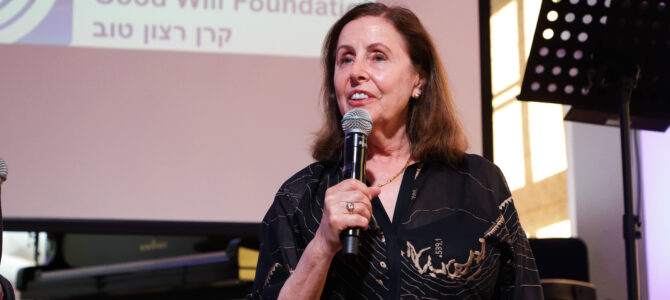Julia Kagan Baumann, the daughter of the late Saul Kagan, delivered the following speech at the Lithuanian Jewish Community on the occasion of the opening of the Saul Kagan Welfare Center there on May 24, 2022:
I am deeply honored to be here at the dedication of the Saul Kagan Welfare Center at the 5th Litvak World Congress in Vilnius, the city of my father’s birth. I speak for myself; for his sister, Dr. Emma Kagan Rylander; for my beloved stepmother Eleanor Kagan, who is 97; for my cousin Dr. Frances Koblenzer, who is here today from my mother Elizabeth’s side of the family, which embraced my dad. And also for my family of marriage, the Baumanns, who were from Strasbourg in France. My late husband Philippe’s father, Raymond Baumann, co-founded ARIF (the Association for the Restoration of Jewish Works and Institutions in France) to support the Jewish community of France during and after World War II from America. My stepdaughter, Andrea Baumann Lustig, is ARIF’s current president.
Those of you who knew my father know that he would not be standing here with pieces of paper in his hand. One of his many super powers was the ability to speak ex tempore for as long as needed without a single note. He did not pass that skill on to me… I need paper.
But he did pass on a legacy I want to talk about now. And it started here.
The more I have learned about Vilnius, which I cannot stop calling Vilna, as it was in my father’s time, the more I realize that growing up in this city–with its long and deep heritage of learning, of culture, and of concern for social justice–made him the man that he became.
My father was most profoundly a child of Vilna. He carried that need to know the world and make it better in his heart for the whole of his life and he shared it with the whole world.
He was uniquely suited by intellect, temperament, and a wide range of skills–including the ability to work in multiple languages–to do the work he did for so many years. And he basically never stopped.
I remember the dinner celebrating his retirement from the Conference on Jewish Material Claims Against Germany, when he told the assembled group that he’d taken a one–year leave of absence from the U.S. State Department that lasted 50 years.
The following Monday, he was back at the Claims Conference office as a consultant, and was still doing that work at age 90. He would be so proud of the work the Claims Conference continues to do every day.
Saul Kagan set a lifelong example of working with others to achieve a measure of justice in the world for wrongs that can never be righted and to establish principles that stand to this day against injustice all over the world.
He did this work with care, with kindness and with respect and understanding of the other person and their needs and points of view. As he taught his children, me and my late brother, David, it’s not about you, it’s about making the world better in every way that you can. Including negotiating and negotiating and negotiating, for as long as you need to.
It is particularly fitting that you’ve chosen to put his name on a welfare center, as concern for the social good and for helping those in need was a center of both his work for the Claims Conference, and of his life as a volunteer outside of the Claims Conference.
Saul Kagan served for many years on the Board of Selfhelp, an organization in New York City that currently serves 25,000 frail and elderly New Yorkers and is North America’s largest provider of comprehensive services to Holocaust survivors. It was founded in 1936 to help refugees from Nazi Germany. He also sat for many years on the Board of Overseers of the Wurzweiler School of Social Work at Yeshiva University. After he died they invited me to take his seat and, in January of this year I became chair of that Board. One more legacy from my father.
I thank you from the bottom of my heart for keeping Saul Kagan’s name and legacy alive in Vilnius. He was a teenager when he left Vilna, and I hope that many children and teenagers today learn his story and grow up to write new chapters in the fight for a measure of justice in difficult times. We need them very much.


